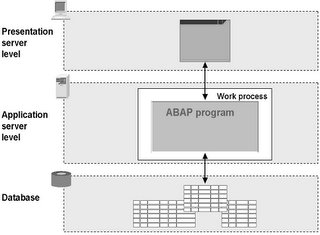ABAP
ABAP (Advance Business Application Programming)
Brief History
Brief History
ABAP originated from an assembler macro language for reporting purposes in the seventies.
ABAP evolved to an interpreted language for reporting and dialog programming in the mid-eighties, with compiler and VM implemented in mainframe assembler as part of the SAP R/2 system.
In the early and mid-nineties it was known as ABAP/4 and it became the programming language for all SAP R/3 applications with the compiler and VM implemented in C as part of the SAP R/3 kernel.
ABAP = Advanced Business Application Programming
In the late nineties it extended to a fully featured OO language and is now called ABAP Objects.
Over the past few decades, ABAP has proven itself as a programming language, with a powerful set of development tools and a high level of maturity when it comes to enterprise-level applications.
ABAP evolved to an interpreted language for reporting and dialog programming in the mid-eighties, with compiler and VM implemented in mainframe assembler as part of the SAP R/2 system.
In the early and mid-nineties it was known as ABAP/4 and it became the programming language for all SAP R/3 applications with the compiler and VM implemented in C as part of the SAP R/3 kernel.
ABAP = Advanced Business Application Programming
In the late nineties it extended to a fully featured OO language and is now called ABAP Objects.
Over the past few decades, ABAP has proven itself as a programming language, with a powerful set of development tools and a high level of maturity when it comes to enterprise-level applications.
ABAP: The SAP® Web AS Business Programming Language
ABAP supports a hybrid programming model. We can use an object-oriented "OO" programming model based on classes and interfaces, and we can use the more classic procedural and event-driven programming model based on function modules, subroutines, dialog modules, and event blocks. Both models can be used in parallel. We can use classes inside classic processing blocks or we can call classic procedures from methods.
There are two types of ABAP programs:
- Dialog programs
- Reports
SAP's ABAP Workbench (SE80) is a set of tools and libraries for designing, implementing, testing and maintaining transactions and reports written in ABAP Objects.
The major tools of the Workbench are:
- Object Navigator
- ABAP Dictionary
- Class Builder/Function Builder/ ABAP Editor
- Screen Painter/Menu Painter
- Class Tester/Function Tester
- Package Builder
- Class Browser, Information System, Data Browser
- Modification Browser, Business Add-Ins
- Transport Organizer



0 Comments:
Post a Comment
<< Home